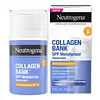What's inside
What's inside
 Key Ingredients
Key Ingredients

 Benefits
Benefits

 Concerns
Concerns

 Ingredients Side-by-side
Ingredients Side-by-side

Butyl Methoxydibenzoylmethane 2.5%
UV AbsorberHomosalate 6%
Skin ConditioningEthylhexyl Salicylate 4.5%
UV AbsorberOctocrylene 8%
UV AbsorberWater
Skin ConditioningSilica
AbrasiveCaprylyl Methicone
Skin ConditioningDiisopropyl Adipate
EmollientDimethicone
EmollientPotassium Cetyl Phosphate
EmulsifyingSynthetic Beeswax
Emulsion StabilisingBenzyl Alcohol
PerfumingHydrolyzed Collagen
EmollientAcetyl Dipeptide-31 Amide
Skin ConditioningTocopheryl Acetate
AntioxidantJojoba Esters
EmollientHydrolyzed Jojoba Esters
Skin ConditioningCaprylyl Glycol
EmollientEthylhexylglycerin
Skin ConditioningCetyl Dimethicone
EmollientGlyceryl Stearate
EmollientPEG-100 Stearate
Behenyl Alcohol
EmollientXanthan Gum
EmulsifyingSodium Polyacrylate
AbsorbentAcrylates/Dimethicone Copolymer
Skin ConditioningDimethicone/PEG-10/15 Crosspolymer
Ethylhexyl Stearate
EmollientChlorphenesin
AntimicrobialDisodium EDTA
Trideceth-6
EmulsifyingBHT
AntioxidantButyl Methoxydibenzoylmethane 2.5%, Homosalate 6%, Ethylhexyl Salicylate 4.5%, Octocrylene 8%, Water, Silica, Caprylyl Methicone, Diisopropyl Adipate, Dimethicone, Potassium Cetyl Phosphate, Synthetic Beeswax, Benzyl Alcohol, Hydrolyzed Collagen, Acetyl Dipeptide-31 Amide, Tocopheryl Acetate, Jojoba Esters, Hydrolyzed Jojoba Esters, Caprylyl Glycol, Ethylhexylglycerin, Cetyl Dimethicone, Glyceryl Stearate, PEG-100 Stearate, Behenyl Alcohol, Xanthan Gum, Sodium Polyacrylate, Acrylates/Dimethicone Copolymer, Dimethicone/PEG-10/15 Crosspolymer, Ethylhexyl Stearate, Chlorphenesin, Disodium EDTA, Trideceth-6, BHT
Water
Skin ConditioningGlycerin
HumectantCetearyl Alcohol
EmollientDicaprylyl Carbonate
EmollientHydrolyzed Collagen
EmollientBakuchiol
AntimicrobialAcetyl Dipeptide-31 Amide
Skin ConditioningButyrospermum Parkii Butter
Skin ConditioningHydroxypropyl Starch Phosphate
Steareth-10
EmulsifyingStearic Acid
CleansingPalmitic Acid
EmollientGlyceryl Dilaurate
EmollientCaprylyl Glycol
EmollientSodium Polyacrylate
AbsorbentPetrolatum
EmollientChlorphenesin
AntimicrobialWater, Glycerin, Cetearyl Alcohol, Dicaprylyl Carbonate, Hydrolyzed Collagen, Bakuchiol, Acetyl Dipeptide-31 Amide, Butyrospermum Parkii Butter, Hydroxypropyl Starch Phosphate, Steareth-10, Stearic Acid, Palmitic Acid, Glyceryl Dilaurate, Caprylyl Glycol, Sodium Polyacrylate, Petrolatum, Chlorphenesin
Ingredients Explained
These ingredients are found in both products.
Ingredients higher up in an ingredient list are typically present in a larger amount.
Acetyl Dipeptide-31 Amide is a peptide.
Caprylyl Glycol is a humectant and emollient, meaning it attracts and preserves moisture.
It is a common ingredient in many products, especially those designed to hydrate skin. The primary benefits are retaining moisture, skin softening, and promoting a healthy skin barrier.
Though Caprylyl Glycol is an alcohol derived from fatty acids, it is not the kind that can dry out skin.
This ingredient is also used as a preservative to extend the life of products. It has slight antimicrobial properties.
Learn more about Caprylyl GlycolChlorphenesin is a synthetic preservative. It helps protect a product against bacteria in order to extend shelf life. In most cases, Chlorphenesin is paired with other preservatives such as phenoxyethanol and caprylyl glycol.
Chlorphenesin is a biocide. This means it is able to help fight the microorganisms on our skin. It is also able to fight odor-releasing bacteria.
Chlorphenesin is soluble in both water and glycerin.
Studies show Chlorphenesin is easily absorbed by our skin. You should speak with a skincare professional if you have concerns about using Chlorphenesin.
Learn more about ChlorphenesinHydrolyzed collagen has a misleading name because it is actually a mixture of various proteins/peptides. This ingredient has skin hydrating properties.
Collagen is the most abundant type of structural protein found in your body. In your skin, it is responsible for keeping it firm and youthful.
Hydrolyzed Collagen is created by breaking up proteins into smaller peptide bonds. These peptides act as humectants and emollients.
Humectants are great at holding onto water, keeping skin hydrated. Emollients create a thin barrier on the skin to prevent moisture from escaping.
There is ongoing debate about whether hydrolyzed collagen works because it increases skin hydration. Skin hydration is also linked to elasticity and the appearance of wrinkles.
Collagen or peptide ingredients can be used in the morning or night. They will not increase sun sensitivity, but you should always wear sunscreen during the day.
According to a manufacturer, this ingredient is a great hair conditioner as well.
This ingredient can be extracted from different sources, including:
Vegan collagen is derived from yeast, bacteria, or plant sources. Vegan collagen would go by a different INCI name, such as hydrolyzed soy protein.
The results are varied.
A study from 2021 found hydrolyzed collagen increased elasticity and improved wrinkles in 1,125 participants between age 20 and 70. Another study found increased skin thickness in participants between the ages of 45 to 59.
However, It is difficult to prove that oral collagen will end up working on your skin. Many of the studies using hydrolyzed collagen also add several vitamins and nutrients into the test mixture as well.
Further studies are needed at this time.
Learn more about Hydrolyzed CollagenSodium Polyacrylate is the sodium salt of polyacrylic acid. It is used as an absorber, emollient, and stabilizer.
This ingredient is a super-absorbent polymer - meaning it can absorb 100 to 1000 times its mass in water. As an emollient, Sodium Polyacrylate helps soften and soothe skin. Emollients work by creating a barrier to trap moisture in. This helps keep your skin hydrated.
Water. It's the most common cosmetic ingredient of all. You'll usually see it at the top of ingredient lists, meaning that it makes up the largest part of the product.
So why is it so popular? Water most often acts as a solvent - this means that it helps dissolve other ingredients into the formulation.
You'll also recognize water as that liquid we all need to stay alive. If you see this, drink a glass of water. Stay hydrated!
Learn more about Water